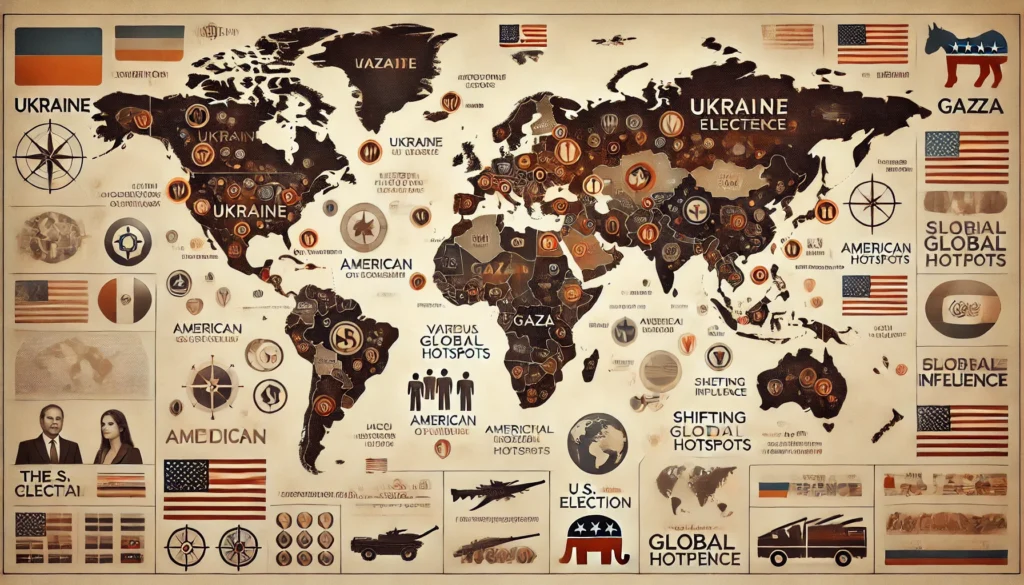How the Election of the United States Impacts Global Conflicts and Focal Areas?
In February 2023, President Joe Biden walked beside Ukrainian President Volodymyr Zelensky through Kyiv’s streets. War-torn Kyiv could hear the howling air sirens. Later, Biden said, “America is a beacon to the world.” However, ahead of another defining US election news, the world will await which direction that “beacon” will next shine.

The presidential race between Vice President Kamala Harris, likely to continue Biden’s foreign policy, and former President Donald Trump, who insists on “Americanism, not globalism,” might make US foreign policy-and consequently its role in the international arena in shaping conflicts on the global level, as for instance in Ukraine and Gaza-look like revolution.
The US influence in world affairs is being put under intense scrutiny. With regional powers charting their own courses and autocratic regimes aligning individually, questions arise as to whether US leadership remains relevant. Yet America’s military and economic might still command attention. I spoke with experts to get their takes on what this election might mean for the US’s global posture.
Military Power and NATO Relations
Former NATO Deputy Secretary General Rose Gottemoeller warned, “Donald Trump is Europe’s nightmare,” in the lingering shadow of his previous threat to leave the alliance. Trump has made US allies historically nervous ever since he indicated that their only way of appeasing the US was if they boosted defense spending and matched a norm of spending 2% of gross domestic product toward that goal-a norm reached by only 23 nations among the alliance’s 30 members last year.
But even were Harris to win, said Gottemoeller, “NATO will be in good hands. Harris will probably carry forward her commitment to the allies, including the Europeans,” including NATO and the EU. But she might, Gottemoeller ventured, “urge Europe, particularly the allies within that community, to really commit more to defense, one of the issues in fact with Biden’s own agenda.” Yet with potentially polarized Congress, Biden may find himself with many checks against his will on domestic issues, as for now, at least, foreign policy seems less contested-a battleground that, among all others, may divide more than unite the Democratic ticket.
The future of NATO and US-European relations may depend on Europe stepping up in leadership. “NATO need not fall apart,” Gottemoeller asserts, “but Europe will need to lead.”
Peacemaker or Divider?
The next president will face a world teetering on the edge of Cold War-era tensions, with escalating risks of confrontation between major powers.
“The US remains the most consequential actor in matters of peace and security,” says Comfort Ero, CEO of the International Crisis Group. But she also warns that America’s influence on peaceful resolution is slipping. Conflicts, particularly those involving multiple global powers, are proving more difficult to resolve. Take the Ukraine: The war there presents competing national interests, but regional disputes in Sudan and elsewhere are increasingly taken in hand by local powers who might prefer conflict over peace.
One of Ero’s main concerns with America is that double standards are eroding the global moral authority of the nation. “There’s one standard for Russia in Ukraine and another for Israel in Gaza,” she points out. Policy inconsistency also plays a role in how Washington approaches crises like Sudan, which receives far less attention than those in Europe and the Middle East.
A Harris victory would likely translate to a continuation of Biden’s policy: support for Ukraine while endorsing Israel’s right to defend itself, but more emphatically, the protection of Palestinian lives. A Trump presidency might, however, heighten support for Israel, allowing for more room to maneuver in Gaza, but might also seek an expeditious settlement in Ukraine, perhaps even against the will of Kyiv.
Middle East Policy and Global Consequences
Middle East policy perhaps best exemplifies the focus area of U.S. foreign relations today. Democrats unanimously support Israel but more vociferously urge restraint lest civilian casualties increase. Harris has followed Biden’s line: “Israel has every right to defend itself against terrorism,” but added, “The death toll among Palestinian civilians is terrible.”.
Trump, however, has signaled that his administration may go even further in supporting Israel, which could potentially push Palestinian concerns to the backburner. His approach to Ukraine may also be more transactional, meaning he may seek a direct negotiation with Moscow, potentially at the expense of Ukraine.
Conclusion: The World Watches Closely
Today Americans are being heard, but everywhere in the world it is perhaps still a long while ahead before the outcomes bring in any new global ties. Whether Harris moves onward from here on a solid tack for Ukraine and for US’s NATO ties while scouting for how to level America’s Middle East interests back up with Trump’s renewed potential to again turn upside-down this situation that would, for the first time ever, take outward trends growing increasingly inward possibly about America’s alliances and obligation abroad.
At a time when global tensions call for action, nothing less than the whole future seems to be in play here in the United States; America’s friends and adversaries are bracing for a whole new chapter in US policy, one that could be decisive in changing the present balance of world power.”.




